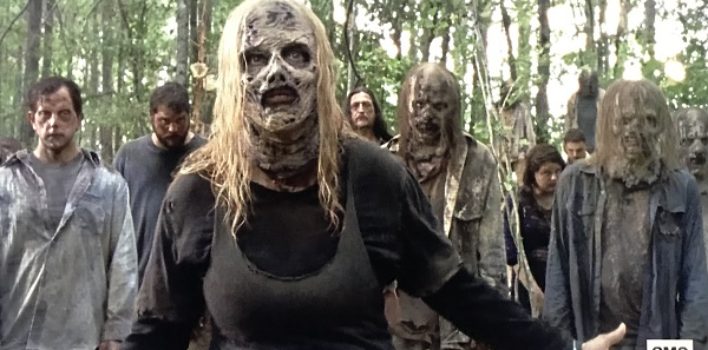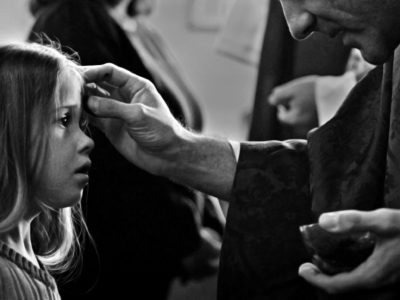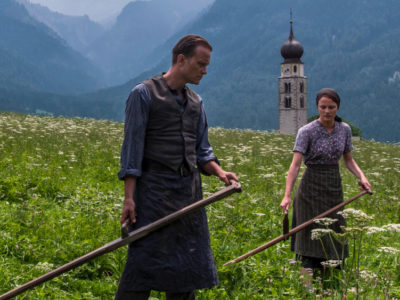The Walking Dead S9E12: Guardians
In reviewing my notes, it struck me that with “Guardians,” we’re being shown three primary interactions between individuals or groups that are at odds with one another in some way. Alpha is handling the return of her daughter and the ramifications for her group. Michonne is managing Alexandria’s protection through isolation during an intense debate with the council. Rosita and Gabriel are working through a love triangle with Siddiq (or quadrangle, depending on Eugene’s involvement). In each of these scenarios we see leaders and role players deciding to be stubborn or to be conciliatory. When those scenarios are analyzed, it becomes clear the show is sending a message that attitudes of compromise and discussion are championed over those of personal bias and inflexibility. But is that warranted? Are there times when rigidity to a goal or standard can be a virtue? Let’s look at each scenario.
My Way or the Highway…
 Alpha succeeds in getting her daughter Lydia back from Hilltop. This itself is a surprise to Lydia; when Alpha begins interrogating her on the arrangements within and abilities of those at Hilltop, Lydia asks, “Is that the only reason you came to get me? For Information?” “What a stupid question!” Alpha replies. Despite an understood policy of leaving the weak and the lost behind, despite the Whisperers literally covering themselves with death, Alpha cannot fully deny her inner humanity and her motherly instinct to protect her daughter. Notice, the same allowance was not given to the woman with the baby as they laid siege to Hilltop. Even leaders of wolf packs will make efforts to protect the young of the pack, but this is literally Alpha’s way or the highway.
Alpha succeeds in getting her daughter Lydia back from Hilltop. This itself is a surprise to Lydia; when Alpha begins interrogating her on the arrangements within and abilities of those at Hilltop, Lydia asks, “Is that the only reason you came to get me? For Information?” “What a stupid question!” Alpha replies. Despite an understood policy of leaving the weak and the lost behind, despite the Whisperers literally covering themselves with death, Alpha cannot fully deny her inner humanity and her motherly instinct to protect her daughter. Notice, the same allowance was not given to the woman with the baby as they laid siege to Hilltop. Even leaders of wolf packs will make efforts to protect the young of the pack, but this is literally Alpha’s way or the highway.
Such inconsistency leads to a small rebellion back at camp, when at least two members call her out on it. Rather than challenging their claim and insisting she was following the pack’s law, she challenges their ability to lead in her place. Her stubbornness and inconsistency in leadership paves the way for her to kill the rebels herself without anyone else batting an eye. “I keep them all safe”, she says of the onlookers. It would appear they value safety more than fairness or consistency of their leader. But what more would you expect from a culture mired in death?
Reluctant Acceptance…
 The arrangement of the Alexandrian leadership is such that Michonne is given the ability to veto anything the council approves if it has to do with matters of safety. Their involvement in the Kingdom’s fair apparently falls under that umbrella. Gabriel and Siddiq strongly disagree, claiming Michonne is grabbing power wherever she can. The scene laying out this debate is a tense one which seems to pit half of Alexandria’s leadership against the other half.
The arrangement of the Alexandrian leadership is such that Michonne is given the ability to veto anything the council approves if it has to do with matters of safety. Their involvement in the Kingdom’s fair apparently falls under that umbrella. Gabriel and Siddiq strongly disagree, claiming Michonne is grabbing power wherever she can. The scene laying out this debate is a tense one which seems to pit half of Alexandria’s leadership against the other half.
When the Kingdom’s needs are highlighted, Siddiq says, “What does it mean for Alexandria to survive if the Kingdom falls?” to which Michonne simply replies, “It means Alexandria survives”. Michonne’s isolationist attitude is new in this half of the season, but she is staunchly dedicated to it. Here’s where the contrast between communities comes in to play.
Despite Michonne’s rigidity regarding isolationism, she is not beyond persuading and at least believes herself to be part of a leadership committee rather than a dictatorial leader. This means when her own daughter Judith calls her on her own inconsistency about how she views people, she is convicted by it. You might even say she is pierced to the heart. She softens her stance, reluctantly, and allows the council to have their way regarding the fair even though she still believes the safety of the community is at risk.
Consensual Tolerance…
Finally, we come to the least dramatic of all interactions this episode. That is strange to say, considering this one involves baby-daddy drama: Rosita is caught in a love quadrangle, and she manages to find the only three men on the planet that could peaceably come to terms. She loves Gabriel and wants to be with him, but she’s carrying Siddiq’s baby, all while Eugene decides to concede any hopes of a relationship with her and deal with his feelings separately. He even constructs a series of flow charts to help Gabriel wade through the waters of Rosita.
Gabriel and Siddiq both appear completely at ease with sharing some fatherly role. In fact, it seems everyone has completely skipped the part where they’re angry at Rosita or each other for unfaithfulness. So while this may be the “best” message the show offers in terms of tolerance and acceptance, it’s also the least believable. It strikes me as a contrivance of convenience in order to make the path of acceptance and tolerance appear to also be the least rocky.
In Other News…
 Continued in this episode is Henry’s quest to free Lydia from the Whisperers; specifically from the punishment of her mother. Henry serves as a solid stand-in for the audience’s first exposure to the inner workings of this group. His horror at some of their actions and methods is reflective of an advanced society’s view of a more barbaric culture. The kill-or-be-killed mantra is one that Alpha regularly champions, and there is little room for mercy, patience, or any other peaceful qualities. Henry is an injection of care and consideration for Lydia in a world where she has experienced very little of either.
Continued in this episode is Henry’s quest to free Lydia from the Whisperers; specifically from the punishment of her mother. Henry serves as a solid stand-in for the audience’s first exposure to the inner workings of this group. His horror at some of their actions and methods is reflective of an advanced society’s view of a more barbaric culture. The kill-or-be-killed mantra is one that Alpha regularly champions, and there is little room for mercy, patience, or any other peaceful qualities. Henry is an injection of care and consideration for Lydia in a world where she has experienced very little of either.
My Rating: B-
 The faux ease of the baby-daddy drama really grated on me and should be a lot for any viewer to swallow. Think back to the Rosita-Sasha-Abraham quarrel and you’ve got a much fuller view of what competing relationships typically look like. I did like the setup with Negan, and how Judith pleaded for Michonne to reconsider her judgement on him. That arc has played out nicely this season and I’m anxious to see if we might reap some fruits of that work before the end of the season, particularly if a major conflict with the Whisperers is on the way. I’m also really loving the dynamic between Alpha and Beta. His loyalty and her ruthlessness are playing well off each other.
The faux ease of the baby-daddy drama really grated on me and should be a lot for any viewer to swallow. Think back to the Rosita-Sasha-Abraham quarrel and you’ve got a much fuller view of what competing relationships typically look like. I did like the setup with Negan, and how Judith pleaded for Michonne to reconsider her judgement on him. That arc has played out nicely this season and I’m anxious to see if we might reap some fruits of that work before the end of the season, particularly if a major conflict with the Whisperers is on the way. I’m also really loving the dynamic between Alpha and Beta. His loyalty and her ruthlessness are playing well off each other.








Pingback: The Walking Dead S9E13: Chokepoint | Reel World Theology